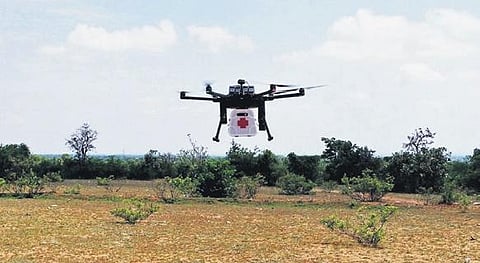

NEW DELHI: After delivering life-saving medical supplies, drones are now carrying tissue samples for quick analysis to speed up surgeries.
Taking the lead in using Unmanned Aerial Vehicles (UAVs) or drones to overcome the challenges of last-mile health service delivery in India, the Indian Council of Medical Research (ICMR) announced a collaboration with Kasturba Gandhi Medical College, Manipal, in Karnataka for faster delivery of health outcomes in rural areas.
In a video posted on X, formerly Twitter, the apex research body said the initiative would use drones to swiftly transport clinical samples from limited-resource hospitals in rural areas to tertiary hospitals with advanced diagnostic facilities. The inaugural flight took off on Wednesday.
The move will help surgeons to make faster and more accurate critical medical decisions, especially when a sample is sent for investigation during a cancer surgery, and will also improve patient outcomes.
“Next milestone achieved in healthcare delivery via drone! Tissue sample transported mid-surgery from a peripheral hospital for advanced pathological testing at the tertiary setting for deciding if the resected tissue is cancerous or not,” ICMR said.
Speaking to The New Indian Express, Dr. Sumit Aggarwal said the drone efficiently transported an intraoperative tissue sample from a patient at Dr TMA Pai Rural Hospital, Karkala, Udupi, to Kasturba Medical College, Manipal Academy of Higher Education Manipal, a tertiary care hospital, covering a distance of approximately 37 kilometres in just 16 minutes.
“This journey typically takes around 50-60 minutes by road. Upon arrival, the sample was promptly analysed, and the report was electronically conveyed back to the peripheral hospital. Subsequently, the surgeon proceeded with the surgery based on the received report. The sample was sent to rule out any malignant aetiology for Acute Appendicitis/Mucocele of Appendix,” he added.
“This initiative utilises drones to swiftly transport clinical samples from limited-resource peripheral hospitals to tertiary hospitals with advanced diagnostic facilities, expediting critical medical decisions during surgeries,” he said.
The drone-based delivery is expected to improve patient convenience and compliance while alleviating the burden on tertiary care hospitals, he stressed.
Dr. Rajiv Bahl, Secretary, the Department of Health Research (DHR), and Director-General, ICMR, emphasized, "The 'i-DRONE' initiative was utilized during the Covid-19 pandemic by ICMR for distributing vaccines to inaccessible areas. Subsequently, successful demonstration runs for delivering blood and medications to reduce delivery time have been conducted. In this ongoing study, our focus is on the transportation of tissue specimens using drone technology.
“We hope this initiative will contribute to drafting standard operating procedures for the future and provide the next level of care to patients," he said.
The initiative, in partnership with TSAW Drones, a healthcare drone logistics start-up, will help reduce the risk of infection to patients, boost their convenience and compliance, and cut down the burden on tertiary care hospitals.
In October last year, ICMR announced its tie-up with TSAW Drones for a study across three locations in Telangana, Karnataka, and Himachal Pradesh on transporting medical supplies by drones.
ICMR, in a study last year, had said that drones are “emerging technologies” with the potential to leapfrog the last-mile logistics solution for transporting medical supplies, thus strengthening the healthcare system.